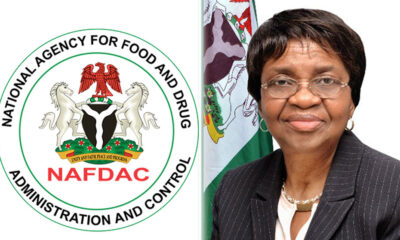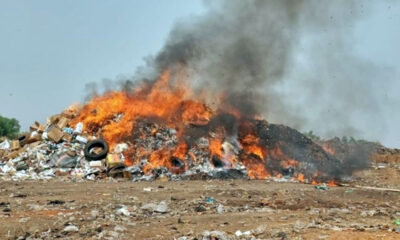Health
NAFDAC shuts 11,000 fake drug shops, discovers USAID-donated items

NAFDAC shuts 11,000 fake drug shops, discovers USAID-donated items
Following the ongoing crackdown on illicit drug trade in major drug markets nationwide, the National Agency for Food and Drug Administration and Control, NAFDAC, yesterday, said it had shut down over 11,000 shops in Aba, Onitsha, and Idumota drug markets even as it has arrested 40 people linked to the sale of unregistered and dangerous drugs.
Conducting journalists around its warehouse in Apapa, Lagos, the Director-General, Prof. Mojisola Christianah Adeyeye, disclosed that the agency has also evacuated over 77 truckloads of illicit and counterfeit drugs.
According to her, out of the 77 truckloads, 27 were from Idumota while Onitsha and Aba recorded 30 and 20 respectively.
Adeyeye revealed that a total of 3,027 shops were closed in Idumota, 4,000 shops shut in Onitsha with the operation still only 20 per cent complete, and another 4,000 in Osisioma in Aba.
She said: “We found vaccines that are not supposed to be stored outside the refrigerator. We found controlled substances and condoms that are supposed to have been destroyed since 2022. We found products donated by USAID. We found Antiretrovirals for free use.
“We found tramadol, container loads of analgin that had been banned in Nigeria before my time. How did it get into the country or market? We have found machines that they are using to change the dates of drugs that are supposed to have expired in 2022 or 2023.
READ ALSO:
- Lagos Assembly crisis: DSS arrests three for assaulting officers
- Another Niger tragedy as 14 travellers die in tanker, bus collision
- El-Rufai seeks North/South-South alliance ahead of 2027
They will change it to 2028 and people will take and keep not getting well.”
She said the evacuated drugs are running into trillions.
She explained that the operation, which has already spanned over three weeks, was made possible with support from the National Security Adviser (NSA) and the Pharmacists Council of Nigeria (PCN).
Adeyeye further addressed concerns from traders who claimed the agency was disrupting their businesses.
“We are not disturbing trade. We are protecting lives. We are trying to safeguard the future of our young people from becoming victims of harmful drugs.
“We are trying to make sure that patients survive from bad medicine. We are trying to make sure that if you have hypertension you will get your hypertension relieved because you are taking good medicine.”
She lamented that NAFDAC’s findings during the operation have been alarming.
“In addition to expired medications, the agency discovered drugs stored in unsanitary conditions, including toilets and poorly ventilated warehouses without windows.
Among the seized drugs were Tramadol 225mg, a potent opioid capable of causing severe neurological damage, and Tapfradol, a dangerous combination of tapentadol and carisoprodol, which has been banned in India.
READ ALSO:
- Joe Igbokwe undergoes surgery after swallowing bone with pounded yam
- EPL: Manchester United fight back to secure dramatic draw at Everton
- NAFDAC tackles Obi, says ‘Don’t politicise our clampdown on fake drugs’
Adeyeye disclosed that many of the drugs seized were smuggled into the country and are not registered in NAFDAC’s database.
“We are seeing drugs stored in conditions that make them even more harmful. These include products requiring refrigeration, like vaccines, being kept at room temperature,” she explained.
Adeyeye acknowledged the resource constraints faced by the agency, citing a lack of sufficient staff and funding. “Our staff are doing the work of five people because we don’t have enough personnel.”
She urged the federal government to provide more support to NAFDAC.
Addressing Nigerians, Adeyeye advised caution when purchasing medications. “If you bought medicine from a street corner, throw it away. Only buy from a reputable pharmacy store,” she urged, emphasising the critical role of parents in monitoring their children’s activities to prevent drug abuse.
She also called on the federal government to tighten border security to prevent the smuggling of counterfeit drugs.
“The porous borders are making our job more difficult. We need more manpower at the borders to stop these harmful products from entering the country.
NAFDAC is far from finished with its mission. The agency plans to expand its operations to other states, working closely with sister agencies to ensure compliance with regulations.
“This is just the beginning. We will not stop until the menace of substandard and falsified drugs is eradicated from Nigeria,” Adeyeye vowed.
NAFDAC shuts 11,000 fake drug shops, discovers USAID-donated items
Health
Lassa Fever Deaths in Nigeria Rise to 51 After 15 Killed in Early February – NCDC

Lassa Fever Deaths in Nigeria Rise to 51 After 15 Killed in Early February – NCDC
Nigeria is facing a rising Lassa fever outbreak in 2026, with 15 deaths recorded in the first week of February, pushing the total fatalities from confirmed cases to 51 between the first and sixth epidemiological weeks, the Nigeria Centre for Disease Control and Prevention (NCDC) has reported. This reflects the continued severity of the viral haemorrhagic disease. The 15 deaths reported between February 2 and 8 translate to a Case Fatality Rate (CFR) of 21.3 per cent, higher than the 19.4 per cent recorded during the same period in 2025, despite a decline in overall suspected cases compared to last year.
Two healthcare workers were also infected in week six of the outbreak, highlighting the ongoing risks faced by frontline responders. Cumulative data for 2026 show 1,034 suspected cases, 240 confirmed cases, and four probable cases, spread across 10 states and 42 Local Government Areas (LGAs). For comparison, during the same period in 2025, Nigeria recorded 1,913 suspected cases, 413 confirmed infections, and 80 deaths across 11 states and 63 LGAs, showing a reduction in suspected cases but persistence of high fatality rates.
READ ALSO:
- Mob Kills Injured Motorcycle Rider After AK‑47 Rifles, Ammunition Found in Crash Scene
- Tacha Condemns False Rape Allegations After Mirabel Admits Fabrication
- UK Court Hands Life Sentence to Nigerian Teen for Knife Attack Killing
In the latest reporting week alone, 15 deaths occurred from 74 confirmed infections out of 271 suspected cases, resulting in a weekly CFR of 20.3 per cent. Confirmed cases increased from 44 in epidemiological week 5 to 74 in week 6, indicating a week-on-week rise in infections. The new confirmed cases were reported across eight states — Taraba, Ondo, Bauchi, Edo, Benue, Nasarawa, Kogi, and Ebonyi — affecting 24 LGAs.
Data analysis shows that 89 per cent of confirmed infections in 2026 are concentrated in four high-burden states: Bauchi (38%), Taraba (22%), Ondo (20%), and Edo (9%), while the remaining 11 per cent of cases were reported from six other states. The outbreak predominantly affects people aged 21 to 30 years, although cases range from 1 to 74 years, with a median age of 29 years. The male-to-female ratio among confirmed cases stands at approximately 1:0.7.
To manage the outbreak, the NCDC has activated the National Lassa Fever Multi-Partner, Multi-Sectoral Incident Management System (IMS) to coordinate surveillance, case management, laboratory support, and risk communication across affected states. The agency has urged citizens to adopt preventive measures such as improving sanitation and hygiene, practicing rodent control, ensuring early presentation of suspected cases at health facilities, and cooperating with public health authorities. The NCDC emphasised that timely intervention, early treatment with Ribavirin, and community awareness are critical to reducing fatalities and containing the outbreak.
Lassa Fever Deaths in Nigeria Rise to 51 After 15 Killed in Early February – NCDC
Health
Ramadan Health Tips: Six Ways to Stay Hydrated While Fasting

Ramadan Health Tips: Six Ways to Stay Hydrated While Fasting
Staying hydrated during Ramadan is essential for maintaining energy, focus, and overall well-being while observing long hours of fasting. Health experts warn that poor hydration can lead to fatigue, headaches, dizziness, and reduced concentration. Below are six essential, numbered tips to help you stay properly hydrated throughout the holy month:
1. Drink Enough Water Between Iftar and Suhoor
Ensure you consume 6–8 glasses of water between Iftar and Suhoor. Spread your intake gradually instead of drinking large amounts at once, allowing your body to absorb fluids effectively.
2. Break Your Fast With Water
Start Iftar with water to quickly replace fluids lost during the day and prepare your digestive system for food. Avoid sugary or carbonated drinks at this stage, as they can increase thirst later.
READ ALSO:
- Tinubu Urges Senate to Confirm Yusuf for NAHCON, Marafa for INEC
- Galatasaray Stun Juventus 5–2 in UEFA Champions League
- Vinicius Jr’s Wonder Goal Gives Real Madrid Victory Over Benfica
3. Eat Water-Rich Foods
Include fruits and vegetables with high water content, such as watermelon, oranges, cucumbers, tomatoes, lettuce, and soups. These foods support hydration while providing essential nutrients.
4. Reduce Salty, Spicy, and Fried Foods
Limit foods high in salt, oil, and spices, especially at Suhoor, as they increase thirst and can cause dehydration during fasting hours.
5. Limit Caffeine Intake
Reduce consumption of coffee, tea, and energy drinks, as caffeine has a diuretic effect that causes the body to lose more fluids. If taken, balance it with extra water.
6. Never Skip Suhoor
Suhoor plays a crucial role in hydration and energy. Eat a balanced pre-dawn meal that includes water, fruits, vegetables, whole grains, and protein to help sustain you throughout the day.
Maintaining proper hydration during Ramadan fasting helps support digestion, boosts energy levels, and keeps the body functioning optimally throughout the holy month.
Ramadan Health Tips: Six Ways to Stay Hydrated While Fasting
Health
NUFBTE Workers Occupy NAFDAC Lagos Office Over Sachet Alcohol Ban

NUFBTE Workers Occupy NAFDAC Lagos Office Over Sachet Alcohol Ban
Members of the National Union of Food, Beverage and Tobacco Employees (NUFBTE) on Thursday staged a protest at the NAFDAC office in Isolo, Lagos, demanding the reversal of the agency’s ban on sachet and PET-bottled alcoholic beverages. The union claims the ban contradicts a directive reportedly issued by the Federal Government, and they want production lines that were sealed to be immediately reopened.
The protesters, including manufacturers, distributors, and industry workers, argued that the enforcement of the ban threatens jobs, livelihoods, and the operations of small and medium-sized enterprises that rely on sachet alcohol sales. During the demonstration, union members handed a petition to NAFDAC officials, urging dialogue and a more balanced approach that safeguards both public health and the food and beverage sector.
NUFBTE cited alleged instructions from the Office of the Secretary to the Government of the Federation and the Office of the National Security Adviser, claiming that NAFDAC should suspend enforcement. The union said continued closure of production lines and restriction of alcohol sales would lead to economic hardship and widespread job losses.
READ ALSO:
- Naira Could Trade Below ₦1,000/$ With Dangote Refinery at Full Capacity — Otedola
- Adeyanju Urges EFCC, DSS to Probe El-Rufai Over Alleged Corruption, Insecurity in Kaduna
- Granite-Laden Truck Kills Motorist, Leaves Wife Critically Injured in Lekki–Ajah Crash
However, NAFDAC rejected the claims, with Director-General Prof. Mojisola Adeyeye stating that no federal directive has instructed the agency to halt the ban. In a statement, the regulator described circulating reports as “false” and “misleading,” emphasizing that its actions are within statutory authority and in line with official government policies.
“NAFDAC has not received any formal directive to suspend its regulatory or enforcement activities concerning sachet alcohol,” the statement read. The agency reiterated its commitment to public health protection, regulatory compliance, and consumer safety, warning the public and industry stakeholders to rely on verified information from official channels.
The ban, implemented earlier this month, targets alcoholic beverages packaged in sachets and containers smaller than 200ml, a measure aimed at reducing unregulated alcohol consumption and protecting vulnerable groups. While the policy has faced backlash from workers and businesses, NAFDAC maintains that it is necessary for national health and safety.
The protest underscores the tension between regulatory enforcement and economic concerns, as workers continue to call for inclusive policymaking and engagement with industry stakeholders to mitigate the impact on jobs and local businesses.
NUFBTE Workers Occupy NAFDAC Lagos Office Over Sachet Alcohol Ban
-

 International1 day ago
International1 day agoCanada Opens New Express Entry Draw for Nigerian Workers, Others
-

 News2 days ago
News2 days agoKorope Drivers Shut Down Lekki–Epe Expressway Over Lagos Ban (Video)
-

 Health2 days ago
Health2 days agoRamadan Health Tips: Six Ways to Stay Hydrated While Fasting
-

 News13 hours ago
News13 hours agoPolice to Arrest TikToker Mirabel After She Recants False Rape Claim
-

 Politics7 hours ago
Politics7 hours agoPeter Obi Launches ‘Village Boys Movement’ to Rival Tinubu’s City Boys Ahead of 2027
-

 metro1 day ago
metro1 day agoOsun Awards 55.6km Iwo–Osogbo–Ibadan Road Project to Three Contractors
-

 Entertainment2 days ago
Entertainment2 days agoActress Destiny Etiko Breaks Silence on Alleged Nollywood Betrayal
-

 International15 hours ago
International15 hours agoEpstein, Ex-Israeli PM Named in Alleged Profiteering From Boko Haram Crisis















